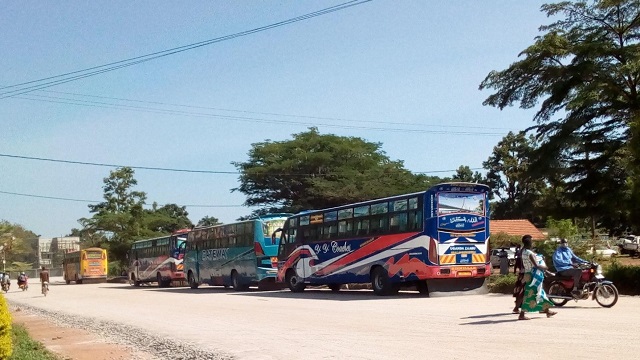
Kampala, Uganda | THE INDEPENDENT | Reduced demand for upcountry travel, the relatively high fares and the rising costs of fuel have combined to inflict losses on bus companies, according to operators URN talked to.
They however say they cannot abandon their business at this time because they have to maintain, hoping that this will be short-lived.
For 10 months now, the public transport sector has not operated normally since the outbreak of the Coronavirus in the region saw the government direct the grounding of buses and taxis in March 2020.
In June 2020, public transport restrictions were eased and the president allowed that buses operate, but at half capacity.
Most of the buses carry between 64 and 72 passengers, meaning that under the restriction, they are required to carry between 32 and 36 passengers depending on the size or capacity of the bus.
However, this at first excluded travel from and to border districts until September 2020 where the restriction was also lifted. In June 2021, the president again suspended passenger transport services as the cases started rising faster than before.
This time he said, this would be for 42 days. But 12 days after this directive, he said he was announcing a new 42-day lockdown, meaning that in total it would last 54 days.
At the beginning of August, the buses and taxis were allowed to resume, but carry half capacity passengers.
In all these measures, the bus operators are allowed to charge double the usual fare so as to cater for the revenue shortfall left by carrying fewer passengers.
However, the bus operators say, while the idea to double the fare was a welcome one, it has proved to be impractical because an average passenger cannot afford it.
They say even the number of passengers travelling upcountry or across the borders has since reduced greatly.
Hakim Sserwanga, the Accountant at Goldline Coaches says that there is a very low turn up of passengers due to the increment in the transport fares.
Goldline plies the Kampala-Juba and Kampala-Ibanda-Kamwenge routes.
The numbers have also been affected by the changing lifestyle among Ugandans and economic structure of the country, among others, which have seen people reduce their reasons for travel.
Because of this, several times, the buses start their journeys with fewer passengers than they are allowed to.
“You find that you have 20 people in the bus or 15 who don’t even pay the fuel you have to take for the journey yet you have to go,” Sserwanga says adding that they are also compelled to give discount to passengers who ask for it, other than driving an empty bus.
The operators say that it is even harder in the morning to get passengers than in the evening, yet most of them have fixed travel schedules.
“In the morning when you get 15 or 20 passengers you feel lucky, yet that is just about half of the passengers you should be carrying as per the Ministry of Health guidelines,” he says.
This has not been helped by the constantly increasing fuel prices, a situation that has also affected their profitability.
The operators say that since the first lockdown, cost of the fuel they consume for a particular route has been increasing, yet they cannot increase the fares beyond the current rates.
In February 2020, just before the outbreak of the pandemic in Uganda, a litre of petrol was going for 3,600 shillings while dieselwas at 3,300 shillings. This has since gone up by an average of 800 shillings, with Petrol now costing up to 4,500 while diesel goes for 4000 shillings a litre at some stations.
Sserwanga says for example, that currently they spend 2.1 million shillings on fuel alone to drive to drive a bus from Kampala to Juba, an increase by a third.
He says that in most cases, after these and other costs of maintaining a bus, the company does not have enough left to meet the staff costs.
“I have to pay the driver 100 dollars (360,000 shillings) every route and a salary of 600,000 shillings a month, while a conductor and a turn boyeach get each gets 60,000 for every route and a monthly salary of 200,000 shillings,” Sserwanga says.
Amon Basiima of Ibabu Coaches says that the many government taxes on buses and on spare parts, among other items, on top of the current situation of COVID-19, is affecting their earnings greatly.
He says that these and other costs leave them with very little or no profits at all, mainly because the passengers cannot afford to pay more even if they wanted to.
Basiima adds that sometimes the owner of the company has to get money from other sources so as to fund the operations of the busses because sometimes they do not make enough to meet all the costs.
*****
URN
Cue out: …providing a service.”//
 The Independent Uganda: You get the Truth we Pay the Price
The Independent Uganda: You get the Truth we Pay the Price



